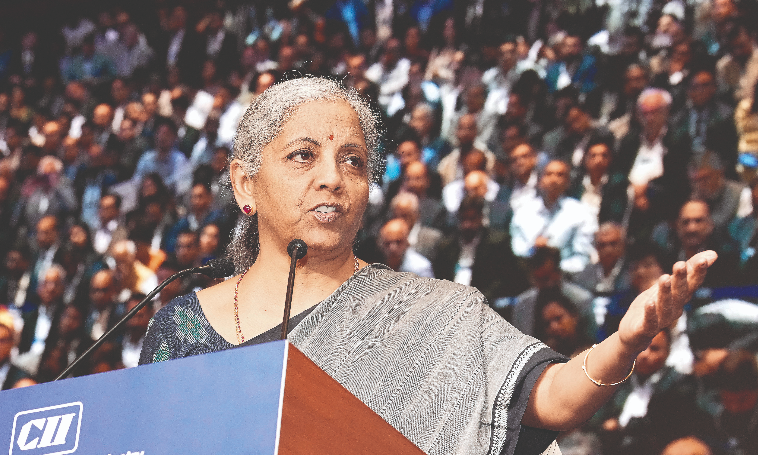Modernizing India’s Manufacturing Landscape: A Path to Progress:-
In a world where technological advancements shape the trajectory of nations, India stands at a pivotal crossroads in its manufacturing sector. Today, the Finance Minister addressed a pressing need for more sophistication in India’s manufacturing landscape. As the heartbeat of economic growth, the manufacturing sector holds immense potential to drive innovation, create employment opportunities, and elevate India’s global standing. However, to realize this potential, a concerted effort towards modernization is imperative.
At the heart of the matter lies the recognition that traditional manufacturing practices are no longer sufficient to compete in a rapidly evolving global market. While India has made significant strides in various industries, there remains a gap in embracing cutting-edge technologies and adopting advanced manufacturing processes. This gap not only hinders productivity but also limits the ability to produce high-value goods that can command global demand.
One of the key areas of focus highlighted by the Finance Minister is the need for greater investment in research and development (R&D). Innovation serves as the cornerstone of modern manufacturing, driving efficiency, sustainability, and competitiveness. By fostering a culture of innovation and incentivizing R&D initiatives, India can nurture homegrown solutions tailored to its unique challenges while also positioning itself as a hub for technological excellence. 
Moreover, the adoption of digital technologies such as automation, artificial intelligence, and the Internet of Things (IoT) holds immense promise in revolutionizing the manufacturing landscape. These technologies not only optimize production processes but also enable predictive maintenance, real-time monitoring, and data-driven decision-making. By embracing Industry 4.0 principles, Indian manufacturers can enhance operational efficiency, reduce costs, and deliver superior quality products to the market.
In addition to technological advancements, the Finance Minister underscored the importance of upskilling the workforce to meet the demands of a rapidly evolving industry. The transition towards a more sophisticated manufacturing ecosystem requires a highly skilled workforce capable of leveraging new technologies and adapting to changing market dynamics. Investing in vocational training programs, promoting STEM education, and fostering industry-academia collaborations are essential steps towards building a talent pool equipped for the future.
Furthermore, the Finance Minister emphasized the need for streamlining regulatory processes and improving infrastructure to facilitate seamless business operations. A conducive regulatory environment coupled with robust infrastructure not only attracts foreign investment but also accelerates the pace of industrialization. By reducing bureaucratic hurdles and enhancing connectivity, India can unlock the full potential of its manufacturing sector and propel economic growth.
Importantly, the call for sophistication in manufacturing extends beyond economic considerations to encompass environmental sustainability and social responsibility. As the world grapples with the challenges of climate change and resource depletion, sustainable manufacturing practices have become paramount. The Finance Minister urged manufacturers to embrace eco-friendly technologies, minimize waste generation, and prioritize renewable energy sources to build a greener future for generations to come.
In conclusion, the Finance Minister’s address underscores the critical need for more sophistication in India’s manufacturing sector. By embracing innovation, leveraging digital technologies, upskilling the workforce, and fostering a conducive business environment, India can unlock its true potential as a global manufacturing powerhouse. However, achieving this vision requires a collaborative effort from policymakers, industry stakeholders, and the workforce at large. Together, let us embark on this journey towards a more prosperous and sustainable future for Indian manufacturing. 
Modernizing India’s With Prime Minister Narendra Modi’s imminent return and a promising mandate on the horizon, India stands poised to embark on a journey Central to this vision is the recognition of the private sector as a crucial partner in driving economic growth, innovation, and job creation. The government’s approach, characterized by collaboration and facilitation, sets the stage for a dynamic public-private partnership aimed at unleashing the nation’s full potential.
Under Prime Minister Modi’s leadership, there has been a paradigm shift in the government’s outlook towards the private sector. Gone are the days of excessive regulation and bureaucratic red tape. Instead, the government now views the private sector as an enabler of progress, capable of catalyzing investments, fostering entrepreneurship, and fueling inclusive development.
The government’s role, as envisioned by Prime Minister Modi, is that of a facilitator rather than a mere regulator. By creating an enabling environment conducive to business growth and innovation, the government empowers the private sector to thrive and contribute meaningfully to the nation’s development agenda. This approach is underscored by initiatives such as Make in India, Startup India, and Atmanirbhar Bharat, which aim to boost domestic manufacturing, promote entrepreneurship, and enhance self-reliance.
Furthermore, the government is committed to addressing key bottlenecks and hurdles faced by the private sector. This includes streamlining regulatory processes, reducing compliance burdens, and enhancing ease of doing business. By removing barriers to entry and fostering a transparent and predictable regulatory framework, the government seeks to attract greater investments, both domestic and foreign, and unleash the full potential of Indian entrepreneurship.
Crucially, the government recognizes that collaboration with the private sector extends beyond economic considerations to encompass social development and nation-building. Through initiatives such as Corporate Social Responsibility (CSR) and public-private partnerships (PPPs), the government and the private sector can join hands to address pressing social challenges such as healthcare, education, and environmental sustainability.
In conclusion, as Prime Minister Narendra Modi prepares to lead India into a new era of growth and prosperity, the government’s vision for private sector collaboration stands as a beacon of hope and opportunity. By embracing the private sector as a partner in development and acting as a facilitator of growth, the government lays the foundation for a vibrant and inclusive economy that benefits all sections of society. Together, let us chart a course towards a brighter future, fueled by the synergy of public and private enterprise.




